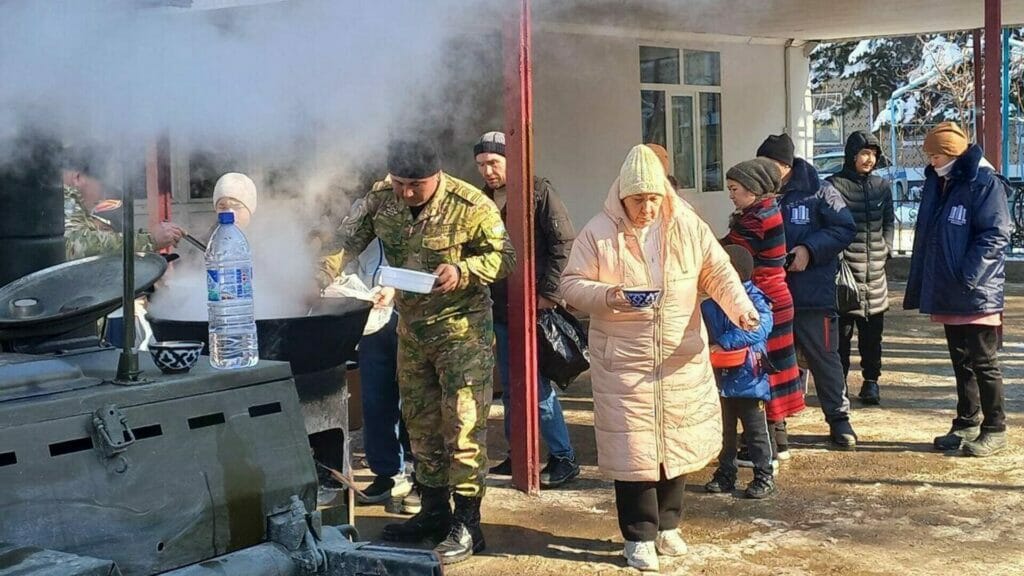Shortage of energy hits Uzbekistan

The abnormal cold wave that hit the capital city of Uzbekistan recently caused problems with the gas and power supply. Kursiv has tried to answer why this happened and what the country is going to do to cope with the energy crisis.
«The cold weather has shown the real condition of our power grid system. Now we know that the local authorities failed to ensure they were ready for winter,» President Shavkat Mirziyoyev said on Monday during his meeting with the Tashkent authorities.
Second power crisis
Uzbekistan has been going through a power system collapse for the second time. In December 2022, the temperature dropped below zero to -10°C to -15°C, which is quite rare for Uzbekistan. The last time the country reported such cold was in 2014.
Low temperature causes a decline in pressure in gas pipelines. Given that 90% of the power in Uzbekistan is produced by gas-consuming thermal power plants, this was not good for the entire system. Because of lower pressure in gas pipelines, power plants weren’t able to keep the expected temperature in the city’s heat system.
To make their homes a bit warmer, Tashkent residents switched to alternative options. In December, two large marketplaces Uzun Market and ZoodMall reported a sharp increase in sales of electric heaters. Uzun said it saw fivefold growth, while ZoodMall reported a 52% increase in heater sales compared to November last year.
Every winter Uzbekistan sees spikes in energy consumption. The country needs more gas to produce energy but the gas reserves steadily decline. The country reported a 3.2% decline in gas production over the first 11 months of 2022. The authorities even used a rolling blackout in December in a desperate bid to keep energy consumption at the pre-winter level.
Some people in Tashkent tried to raise the temperature in their apartments by burning gas, although low pressure in the pipelines makes it virtually impossible and even dangerous. During the coldest days, many were left with no gas, heat or power supply.
President Mirziyoyev stepped in after a huge wave of complaints. He visited Chilanzar Thermal Power Plant in Tashkent, came over to a multistore residential building nearby and talked to its resident.
The weather wasn’t stable. Sometimes warm days come after cold ones and then the cold returns again. In some places, people reported extreme colds of -30°C.
In addition to the severe cold, this winter has been snowy. Both in December and January Tashkent struggled with snowfalls that caused many problems for the transportation system and city crews.
Consequences
In January, tens of districts in the capital city of Tashkent faced blackouts as the local power grid system was significantly overwhelmed. Electricity transformers often switched off due to miscalculations that were made long before many residential buildings were built, according to Mirziyoyev. The president noted that the site plan of Tashkent hasn’t been approved yet and more than 250 buildings were built without permission.
Mirziyoyev has discharged Jakhongir Artikkhodjayev, the mayor of Tashkent, due to these mistakes, as well as «empty talk and lie.» Artikkhodjayevwasinofficefrom 2018 until recently.
In addition, the president’s fury hit the heads of several districts of the city. For example, he discharged FarhodAbdurakhmanov, head of the Thermal Power Plants JSC, as the company failed to finish the overhaul it executed at the Talimardjan Thermal Power Plant with a capacity of 800 megawatts. The overhaul has been continuing for six months and that caused a shortage of three billion kilowatts of energy. Heads of Uztransgas, Uzbekneftegaz and Regional Power Networks were also gotten a serious reprimand for their mistakes.
Moreover, Mirziyoyev ordered the State Security Service and General Prosecutor’s Office to investigate the activity of those discharged officials. The president noted that cases of stealing energy and gas have been reported more often recently (192 cases over the recent months).
«I can’t believe that heads of districts and power and gas supply companies were unaware of these thefts,» he said on January 16.
The president ordered the prime minister and minister of energy to employ all resources and take urgent actions to solve problems with power supply in troubled districts.
Southern gate
Uzbekistan is trying to find solutions for the energy shortage not only inside the country but also outside of it. Currently, the country is importing 10% of daily consumed gas and 8% of daily consumed energy. In December, Uzbekistan signed an agreement with Turkmenistan. The country wants to buy 1.5 billion cubic meters of gas from its neighbor within three months. However, now these arrangements are at serious risk.
On January 12, 2023, Turkmenistan reported problems in its gas field because of the abnormal cold. As a result, Uzbekistan suspended its imports of gas and cut its purchases of energy from abroad by 20%. At the same time, Uzbekistan stopped the export of electricity to provide people and social infrastructure with power. On the other hand, energy supply to big industrial entities dropped by 70 to 80%.
Uzbekistan experienced a shortage of gas even before the accident in Turkmenistan. On January 10, low temperatures and surging demand forced the authorities to stop gas supply to commercial consumers like LPG filling stations, construction material producers and other big consumers of gas. The government says that the supply will be restored after the weather gets warmer.
So far, there is no data concerning the damage caused to the economy by blackouts of energy and gas. According to Minister of Energy Jurabek Mirzamahmudov, the damage may cost millions of dollars. He also mentioned a plan to build new gas storage sites in order to ensure the country has an additional amount of gas in the future.
Uzbekistan is also bidding on renewable sources of energy. The New Uzbekistan Strategy foresees the generation of an additional 30 billion kilowatts per hour by 2026. The goal is to extend the amount of energy generated by the country to 100 billion kilowatts per hour. It is expected that renewable sources (solar, wind and hydroelectric power station) will account for 25% of this figure.
Through renewable sources, Uzbekistan is going to save about three billion cubic meters of gas. For comparison, the country produced 47.3 billion cubic meters of gas over the first 11 months of 2022.

